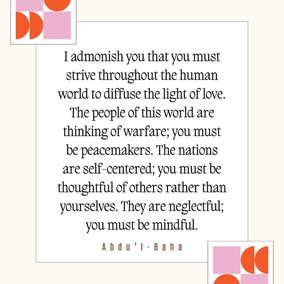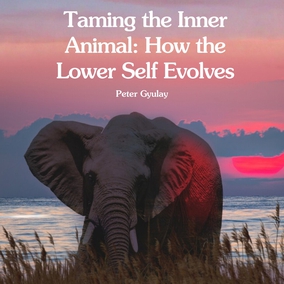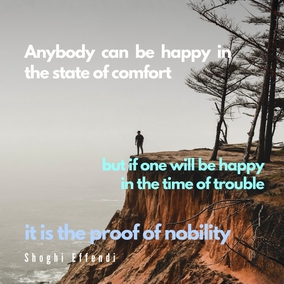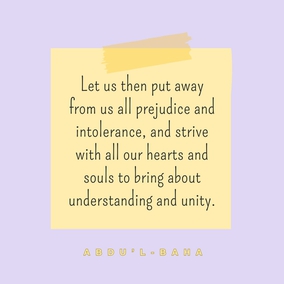The views expressed in our content reflect individual perspectives and do not represent the authoritative views of the Baha'i Faith.
I’ll admit – I’ve made only modest progress throughout my life in understanding the human mind, not for failing to try, but because it baffles even the most astute psychologists.
My own effort has been helpfully guided by the work of biologist Fritjof Capra, who wrote in his book The Web of Life that each living system, from cells to microbes, possesses a manner of mind, or cognition, in a process that “transcends disciplinary boundaries.”
Capra says that such “cognition” is shared by all elements of creation, including man, in a grand process of “self-making,” “far from equilibrium,” which makes it “… philosophically and spiritually more satisfying to assume that the cosmos as a whole is alive …”
Baha’is understand that reality, but, really, what does a teeming and vibrating universe have to do with the mind of man, specifically and personally? How does the Baha’i mind come to rest in such a frenetic field of reality and lay claim to a divinely purposed personhood?
RELATED: The Universal Mind and You
The answer I will offer may surprise you for its simplicity, and even challenge those of you who are steeped in the complexities of psychology.
You see, Capra calls for characterizing our cognitive patterns by means of imaginative, symbolic language, and not the language of facts and formulae which traditional science requires.
He quotes the professional scientist and mathematician Norbert Wiener, who said: “We are but whirlpools in a river of ever-flowing water … We are not stuff that abides, but patterns that perpetuate themselves.”
I cannot emphasize enough the radical implications of using such metaphors in the face of our scientific obsession to quantify everything, to reduce the mystery and beauty of every living thing to height, weight, and speed.
Anyway, I am more poet than scientist and I gravitate to the tool of metaphor for understanding life itself, especially in light of guidance from the Baha’i teachings on the matter, as this quote from Abdu’l-Baha’s book Some Answered Questions explains:
… when you wish to express the reality of the [mind/spirit] and its conditions and degrees, you are obliged to describe them in terms of sensible things. … These expressions are comparisons, analogies, similes, and figurative interpretations in the realm of inner meaning.
In this way, I have come to understand the role of metaphor in comprehending the life of the mind, and of consciousness itself. To me, to know the mind is to catch a butterfly in a net, to observe its flame-like fluttering, and then to let it go. And yes, it’s like studying the patterns of a whirlpool, just as Wiener suggests. It’s like interpreting a poem.
In other words, because the mind is insensible, invisible, and hard to measure, we must rely on similes, comparisons, and metaphors to describe it. A good metaphor uses what is known to inflect what is not rationally measurable. It combines the material with the spiritual in order to disclose an inner reality otherwise undisclosable. Thus a good metaphor marries physicality and spirituality, subjectivity and objectivity in one fell swoop, in a single comparison or image, in one illuminating analogy.
In this way, the poet Rainier Maria Rilke compared man’s essence to that of a powerful, spiritually inspired tree:
If we could surrender to Earth’s intelligence,
We would rise up rooted, like trees.
Baha’i assertions that there is just one God, one religion, and one family of man are all metaphors which represent the innermost reality of the oneness of all things, expressed with the help of physical referents, as “leaves of one tree, drops of one ocean, waves of one sea, flowers of one garden.”
So, as to Baha’i identity, we acquire it by becoming familiar with Baha’i metaphors and, in a sense, coming to inhabit the pictures they paint.
In fact, when we become Baha’is, we give ourselves over to an entire mindscape of metaphor, with writings and meditations and prayers that include “whales plunging, lions crouching, oceans surging, water murmuring, trees swaying, leaves whispering.”
Consider the vast array of other common Baha’i images: “tender plants, fountains of wisdom, tongues of conscience,” all of which describe the essential, hidden reality of our innermost beings.
These are anything but frilly phrases – they are actually catchments of intellectual and spiritual clarity in the face of what is inevitably ordinary and casual human thought, dispersed, chaotic, and disorderly otherwise, or else deadened by the ferocious scientific urge to quantify everything until the mystery of life sadly and shyly withdraws.
When we encounter Baha’i metaphors thoughtfully in prayers and tablets, it is as though we inhabit them, momentarily – or they inhabit us. We become those whales plunging and those lions crouching.
Thus we come to participate personally in the breezes of the Baha’i revelation itself. We breathe in the breath of life and drink from the fountain of living waters, our minds fully realized, having been given permission to think, feel, and act accordingly.
RELATED: The Human Conscience: Proof that God Exists
Baha’i metaphors can even yoke ideas that were formerly at war by asserting that religion and science or men and women, for example, are but two wings of one bird. Thus even metaphor can change the mind of the world, especially since the utterances of Baha’u’llah and Abdu’l-Baha abound with life-altering, convention-busting, spiritually transformative images and language-induced enlightenments.
Abdu’l-Baha employs the metaphor of a bright light, specifically, to describe the mind of man which, when attuned, shines forth in “dazzling rays” of “strange, heavenly power,” so that “god-like impulses may radiate from the conscience of mankind, and this divinely kindled fire which has been entrusted to the human heart may never die away.”
So please consider that the language of Baha’i metaphor, when fully acceded to, ceases to be abstract and symbolic and becomes the literal language of the soul, according to Baha’i scholar Ross Woodman. I would add that it is also the language of mature spirituality, of spiritual and intellectual attainment, of art, of problem-solving, of robust consultation, and even the passport into the discourses of society.
I dare say, all the mice in mazes, as observed by psychologists in lab coats, will never unveil the innermost secrets of human consciousness until they are given tasty metaphors to chew on, and those scientists themselves, at least in part, become poets in that work.
Miller is an independent writer. His most recent book is Sickness, Death, and Resurrection of Holden Caulfield, which can be ordered at first-write.com/bookstore
















Comments
Sign in or create an account
Continue with Googleor